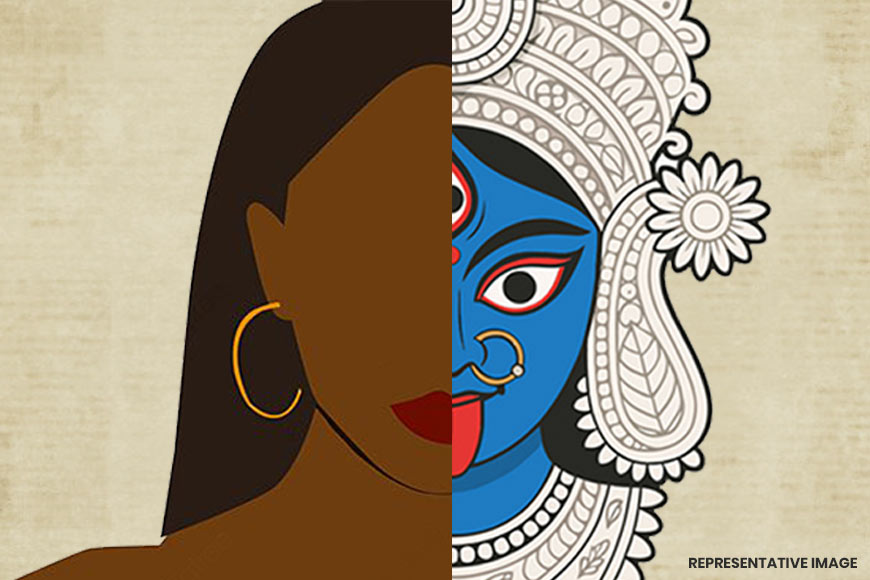She Is Kali: The modern woman’s lesson in strength and survival - GetBengal Story

Her hair is messy in the wind, her tongue is ready, and her eyes sparkle with enough energy to set the world on fire. This woman is Maa Kali — fierce, unapologetic, wild, and powerful. For centuries, Maa Kali has commanded both worship and fear, a goddess who won't neatly fit into the clean, tailored box of divinity. But gushing and chanting genius myth, Goddess Kali represents something so much more human — she is the transferer of every woman who has fought, survived, and reclaimed her right to live.
In this chaotic world, where women's freedom is still being questioned, where safety is a daily consideration, and where power costs something, Kali is reminding us that as women we live the same experience. Her dark skin represents the unknown — those parts of womanhood that society ignores or embarrasses women for — from pain, loss, and betrayal to rage, excitement, and lust. Her garland of skulls is more than a representation of destruction; it is the triumph and dominance over fear, the dominant male, and anything that tries to silence them. Each skull represents a story buried within a woman's mind — not only a tale of violence, but a reminder that these women regained their strength, fought fear, and will finally be recognized.
Kali embodies that there is divinity in ferocity, and there is even beauty in being irrepressible. She is not the manifestation of fear; she is the manifestation of freedom.
Kali’s destruction does not signify a chaos of emotionally driven rage as it is often perceived. It is part of the intentional and necessary dismantling of anything that does not have a positive impact on justice. Within her act of destruction is a dance of change. She reminds us that sometimes structures or people have to be torn down before they can be rebuilt again. With this chaos in the world today, it is impossible for the modern woman not to engage as Kali in some form or another, and the symbol of her destruction has taken new shapes for today's woman — the destruction of silence, to tear down structures of expectation, to confront herself and society's pressures time and time again as she attempts to navigate and build her world on her own terms. Every time a woman out of the chaos finds a voice to say "no" to something that is unjust, every time a woman walks away from a relationship or situation that does not serve her well-being, every time a woman asserts her right to exist as she is…Kali is birthed anew in that process.
However, the power of Kali is not only the destruction. While destruction for destruction's sake exists, alongside the destruction is a compassion indicative of Kali. Within her chaotic energy is the clarity of purpose for the chaos, and often it is the disorder that accompanies this mystical destruction. Kali does not destroy for destruction's sake but rather destroys for regeneration. This is Kali's power, not an awareness of superiority but rather awareness. For many women in contemporary society, power is often wrapped in hesitation under the guise of being more feminine and therefore less threatening. Kali teaches an alternative kind of strength — a strength that does not waver; it is strong and trill. She is not polite with her power; she embodies it. She encourages women everywhere to do the same — own your ambition, your desire, your voice. Stop apologizing for taking up space.
Yet, in the midst of this strength, there is tenderness. Kali is also the mother — the nurturer who protects her children, the healer who soothes after the storm. In her lies the lesson of rebirth. Even after destruction, she restores. Even after pain, she creates. The modern woman too knows this cycle — she breaks, she rebuilds, she begins again. From survivors of violence who learn to trust the world again, to women who start over after failure or heartbreak, to those who fight silent battles every day — each carries a spark of Kali’s rebirth within her.
In this chaotic world, where women's freedom is still being questioned, where safety is a daily consideration, and where power costs something, Kali is reminding us that as women we live the same experience.
It is society, by contrast, that seeks to extinguish that fire and belittles the fierceness of its flames. Society makes the current reality for all women increasingly unsafe, not just by crime but the mindset that creates it--that sees a woman's power as a threat, independent action as arrogance, leisure as rebellion. Hardship begets most fear and that fear is not because of weakness, it is because of the danger of a woman not being afraid. That is Kali's whole expectation of her creation--to have courage in the face of societal fear.
And if that is what Kali expects, will a woman in society ever feel safe? That is exactly what Kali is expecting: courage.
She teaches that not all safety comes from an external source. Sometimes safety comes from within. Safety becomes an educated response towards fear, it is standing up, it is being present when the silence around you expects you to disappear. Independence is no longer a choice but a necessity, it is the new reverence.
Because every time a woman chooses to speak, every time a woman chooses to walk into a space and take up room unapologetically, every time she chooses to hold space for another woman – she honors Kali. She becomes her. The goddess of creation, destruction and recreation does not only reside in temples or statues. She walks with us – with every woman who has ever held her ground, with every mother who has ever fought to protect, with every girl who has dared to wish for a life beyond the defined borders.
Kali embodies that there is divinity in ferocity, and there is even beauty in being irrepressible. She is not the manifestation of fear; she is the manifestation of freedom. And when modern women come to know that – when she comes to know that political power, crying, stepping into her boldness, and compassion can all hold hands – she does not simply exist, she changes the world.
So when a modern woman hears the voice of society telling her she is too loud, too opinionated, too ambitious, she smirks - for she knows better. She is not too much. She is Kali personified: destructive, powerful, creative, and free.










